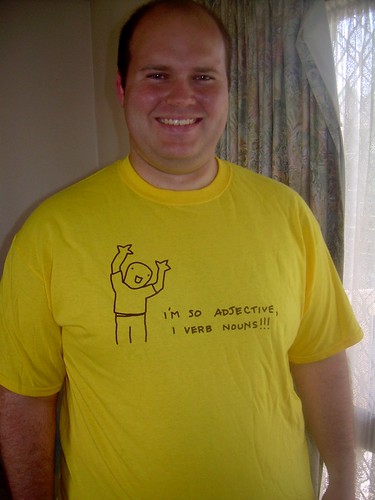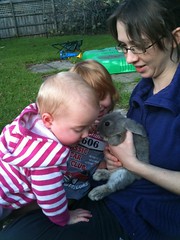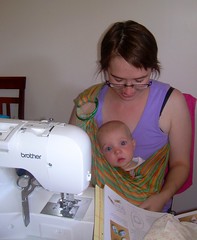This post is part of the Unschool Monday meme, started by Owlet.
The style of educating that most closely resembles what we do is "unschooling," but as with any label, it depends on one's definition. There are a couple of areas in our approach to Harriet's upbringing that beg the question "can we really call ourselves unschoolers?" The first that comes to mind is our decision to place our parenting and our lives more generally, within a feminist framework.
Living within a feminist framework means that we make sense of the world around us by viewing it through feminist glasses, so to speak. For example, while some parents might see dressing their daughters head to toe in the colour pink as communicating to the world that they're girls, or enhancing their daughter's cute-factor, or unquestioningly because "it's just the done thing", we see dressing little girls in pink as a social construction born out of capitalist patriarchy for the purpose of upholding capitalist patriarchy (for more on this you can read these posts: Why not a blue globe for boys?, Mother's Day and the consumption of femininity).
Parenting and educating within a feminist framework means that our understanding of social issues is informed by a background of feminist theory and activism (for more on what feminism means and how it relates to our parenting check out our "feminism: underpinning our family values" post).
So, how do we fuse our feminist framework with unschooling? Surely the unschooled child should be free to choose her own framework for making sense of the world? Aren't we limiting her potential, just as a school would, by putting the feminist glasses on our daughter? Isn't our "rabid feminism" just as stunting as schooling's complete lack of feminism? How many ways can we re-word the same question? (The answer to that last one is: many, many more ;-P)
We don't find our use of feminism to be in opposition to our commitment to unschooling. In fact, our refusal to uphold oppressive patriarchal ideals about what colours, toys and behaviours are appropriate for little girls enhances our daughter's freedom. She has access to the boys section and receives the same love, attention and approval from her parents whether she grabs the baby doll or fire truck off the toy shelf.
At the age of two a lot of our feminist values are irrelevant to Harriet. As far as we know she doesn't notice that she's not clad in pink, and she's not quite ready for the "My Little Ponies are fucked-up" conversation. While we can identify ethical, political and social problems with some of the toys that have come to be Harri's, she plays with them as she sees fit. Because she isn't steered towards certain socially acceptable behaviour through the use of shame, praise, commercial television, formal schooling, or patriarchal role-modelling from her parents, she has creative control over her playtime and imagination. Hence her fucked-up My Little Ponies tend to get breastfed LOL.
We might prefer it if Harri didn't have an interest in the fucked-up My Little Ponies for various reasons, but she came across them through her interactions with the world and she liked them. While we may try to limit Harriet's exposure to the damaging messages patriarchy transmits to her about women and girls, we can't shelter her from it all. We do choose to try to limit messages we see as damaging (such as: little girls should be/love princesses, little girls should wear pink, little girls should be sugar and spice and everything nice, and should grow up to become sexually arousing to men) in the hope of increasing her chances of growing into a confident, self-loving, independent adult with great respect for women.
While we acknowledge that it is possible for girls to grow into women who are confident, self-loving, independent adults who respect their sex even with parents who dress them in pink, praise them for behaving princess-like and have a herd of fucked-up My Little Ponies, it takes a lot of social de-programing and unlearning the patriarchal messages they have grown up with. Our goal is that our feminist parenting will hopefully mean Harriet requires a lot less de-programming and unlearning than say, I needed to reach to the same end.
Finally, it's worth noting that every parent influences how their child makes sense of the world, even unschoolers. Unlike a lot of folks out there, we're comfortable in the knowledge that we are at least aware of which pair of glasses we've got on.
The style of educating that most closely resembles what we do is "unschooling," but as with any label, it depends on one's definition. There are a couple of areas in our approach to Harriet's upbringing that beg the question "can we really call ourselves unschoolers?" The first that comes to mind is our decision to place our parenting and our lives more generally, within a feminist framework.
Living within a feminist framework means that we make sense of the world around us by viewing it through feminist glasses, so to speak. For example, while some parents might see dressing their daughters head to toe in the colour pink as communicating to the world that they're girls, or enhancing their daughter's cute-factor, or unquestioningly because "it's just the done thing", we see dressing little girls in pink as a social construction born out of capitalist patriarchy for the purpose of upholding capitalist patriarchy (for more on this you can read these posts: Why not a blue globe for boys?, Mother's Day and the consumption of femininity).
Parenting and educating within a feminist framework means that our understanding of social issues is informed by a background of feminist theory and activism (for more on what feminism means and how it relates to our parenting check out our "feminism: underpinning our family values" post).
So, how do we fuse our feminist framework with unschooling? Surely the unschooled child should be free to choose her own framework for making sense of the world? Aren't we limiting her potential, just as a school would, by putting the feminist glasses on our daughter? Isn't our "rabid feminism" just as stunting as schooling's complete lack of feminism? How many ways can we re-word the same question? (The answer to that last one is: many, many more ;-P)
We don't find our use of feminism to be in opposition to our commitment to unschooling. In fact, our refusal to uphold oppressive patriarchal ideals about what colours, toys and behaviours are appropriate for little girls enhances our daughter's freedom. She has access to the boys section and receives the same love, attention and approval from her parents whether she grabs the baby doll or fire truck off the toy shelf.
At the age of two a lot of our feminist values are irrelevant to Harriet. As far as we know she doesn't notice that she's not clad in pink, and she's not quite ready for the "My Little Ponies are fucked-up" conversation. While we can identify ethical, political and social problems with some of the toys that have come to be Harri's, she plays with them as she sees fit. Because she isn't steered towards certain socially acceptable behaviour through the use of shame, praise, commercial television, formal schooling, or patriarchal role-modelling from her parents, she has creative control over her playtime and imagination. Hence her fucked-up My Little Ponies tend to get breastfed LOL.
We might prefer it if Harri didn't have an interest in the fucked-up My Little Ponies for various reasons, but she came across them through her interactions with the world and she liked them. While we may try to limit Harriet's exposure to the damaging messages patriarchy transmits to her about women and girls, we can't shelter her from it all. We do choose to try to limit messages we see as damaging (such as: little girls should be/love princesses, little girls should wear pink, little girls should be sugar and spice and everything nice, and should grow up to become sexually arousing to men) in the hope of increasing her chances of growing into a confident, self-loving, independent adult with great respect for women.
While we acknowledge that it is possible for girls to grow into women who are confident, self-loving, independent adults who respect their sex even with parents who dress them in pink, praise them for behaving princess-like and have a herd of fucked-up My Little Ponies, it takes a lot of social de-programing and unlearning the patriarchal messages they have grown up with. Our goal is that our feminist parenting will hopefully mean Harriet requires a lot less de-programming and unlearning than say, I needed to reach to the same end.
Finally, it's worth noting that every parent influences how their child makes sense of the world, even unschoolers. Unlike a lot of folks out there, we're comfortable in the knowledge that we are at least aware of which pair of glasses we've got on.














